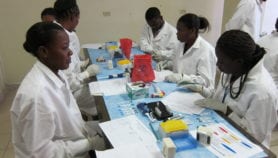By: James Njoroge
Send to a friend
The details you provide on this page will not be used to send unsolicited email, and will not be sold to a 3rd party. See privacy policy.
A leading Kenyan researcher has warned that scientists in developing countries risk sacrificing international recognition of their work if they do not adhere to internationally recognised standards of ethics in the conduct of pre-clinical and clinical studies.
Jason Mwenda, director of Kenya’s Institute of Primate Research (IPR), says that professional laxity, combined with inadequate technical expertise and laboratory equipment, is having a negative impact on the growth of scientific research in the developing world.
Many professional researchers, says Mwenda, seldom adhere to the principles of Good Laboratory Practice (GLP) during their studies, eroding the credibility of their work at the international level.
Pre-clinical studies form the basis for all medical breakthroughs, as data collected at this stage determine whether human trials should go ahead. Therefore, strict adherence to ethical guidelines is necessary during such experiments.
In an interview, Mwenda expressed concern that many research institutes in developing countries lack the internal mechanisms needed to deal with unethical science researchers.
Such individuals, he says, give science in developing countries a bad name, and research-training institutes — especially universities — should introduce the teaching of GLP in their curriculum. But such efforts are undermined by a lack of commitment from researchers in these institutions to impart skills relevant in the fast changing scientific world.
“There are many professors who have not published research papers for a long time in the developing world,” he says. “How do you expect them to know what GLP is if they do not conduct scientific research?”
Mwenda adds: “It is unfortunate that our scientists do not bother to know what is happening at the international level. Probably, this is why they do not know about the existence of international standards of conducting scientific research.”
Mwenda said that as a World Health Organisation (WHO) Collaborating Centre, his own institute had established two bodies to ensure that all experiments conducted there conform to the international ethical standards regarding experimentation on non-human primates.
The institute’s Internal Scientific Review Committee (ISERC) approves all experiments prior to initiation. The Animal Care and Use Committee (ACUC) focuses on the welfare and handling of animals.
However, Mwenda says that Kenya still uses research guidelines designed in 1984. This is despite the fact that the guidelines contain many loopholes, which researchers have exploited to conduct studies without authorisation from the National Council of Science and Technology (NCST) — the country’s research regulatory body.
“Since science is dynamic, such a document is no longer relevant to emerging research needs,” says Mwenda. “This is a major contributor to violation of the principles of GLP by science researchers”.
He has called on the Kenyan government to set up a strong standards regulatory body to co-ordinate and harmonise both pre-clinical and clinical research, and guard against scientific misconduct.
© SciDev.Net 2002













